So, why is this south Calgary raised boy (that’s me, Shane Keating) promoting the Green Line to go from 16th to Shepherd?
It’s because this is the best plan for the City.
It’s also great to see the honorable Michelle Rempel to say anything that doesn’t go north of the river, is crazy talk.
Gosh, I’m actually surprised of the arising issue of Green Line costs. Seems some Councillors need an extra shot of espresso because they’ve forgotten the last 3+ years of Green line Committee Meetings.
I wouldn’t want to think they weren’t paying attention…
Since 2017 the cost has not increased. This talk of $640 million is not new information.
Operating and maintenance costs have always been discussed, and will not happen till 2026. That gives us 6 years to secure it. And that amount has always been disused at City Council and Green Line Committee.
I understand that big projects can get confusing, and I’m a nice guy, so I’ll share my homework for anyone that needs to catch up (to the rest of the Councillors.)
Here’s the receipts
You can find the report: Here
And this report you can find: Here
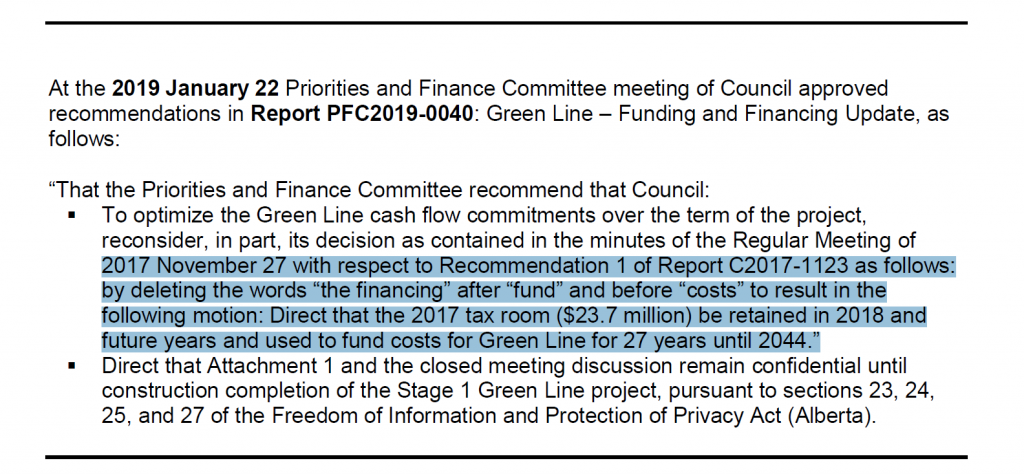
This one you can find: Here
And this one: Here
This one was released on February 21, 2020 and shows the $640 million of financing costs. This cost was regularly reported on the Green Line quarterly reports.
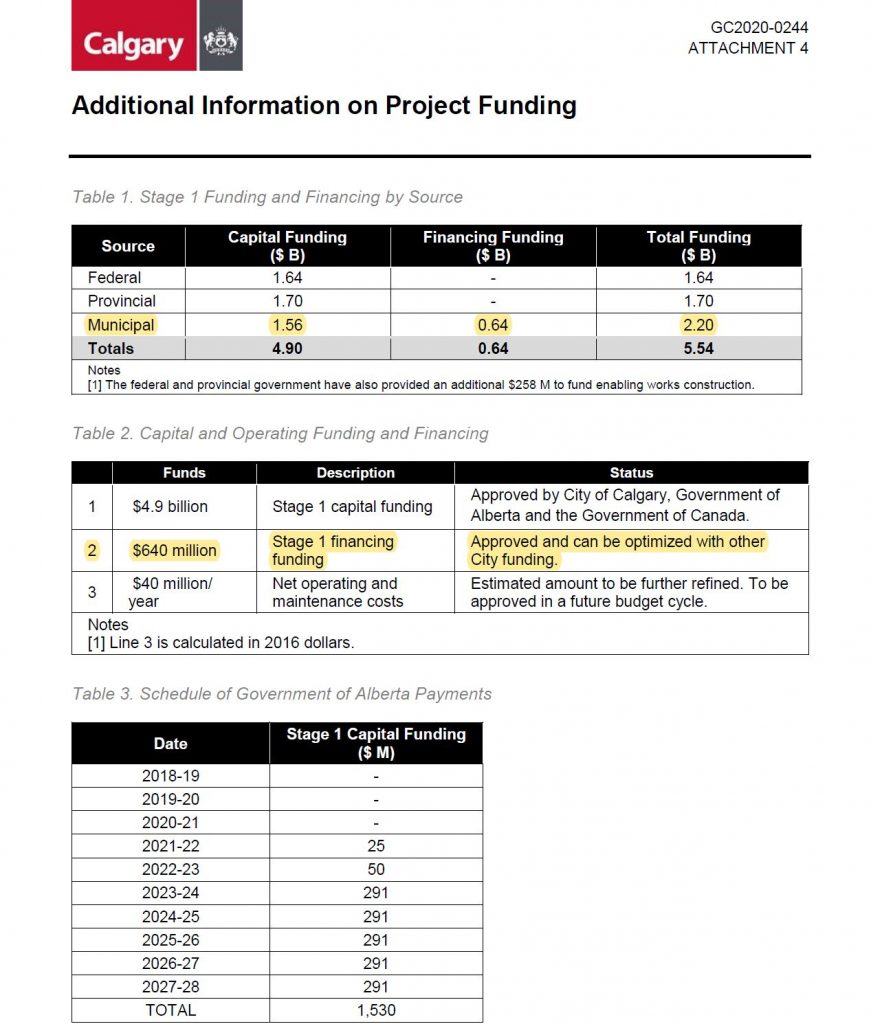
If it feels like this is getting repetitive, you are not the only one. Since 2017 there have been numerous mentions of the Green Line costs.
Some members of Council are raising this issue, and yet, unaware of this coming up over 7 times since 2017. Especially peculiar for those sitting on the Green Line Committee.
So to say that the costs have escalated from previous projections?
False
Taxpayers “footing” the bill for financial operations?
False
That any of this is new information?
False
Below are some more examples of how the amounts have been discussed.
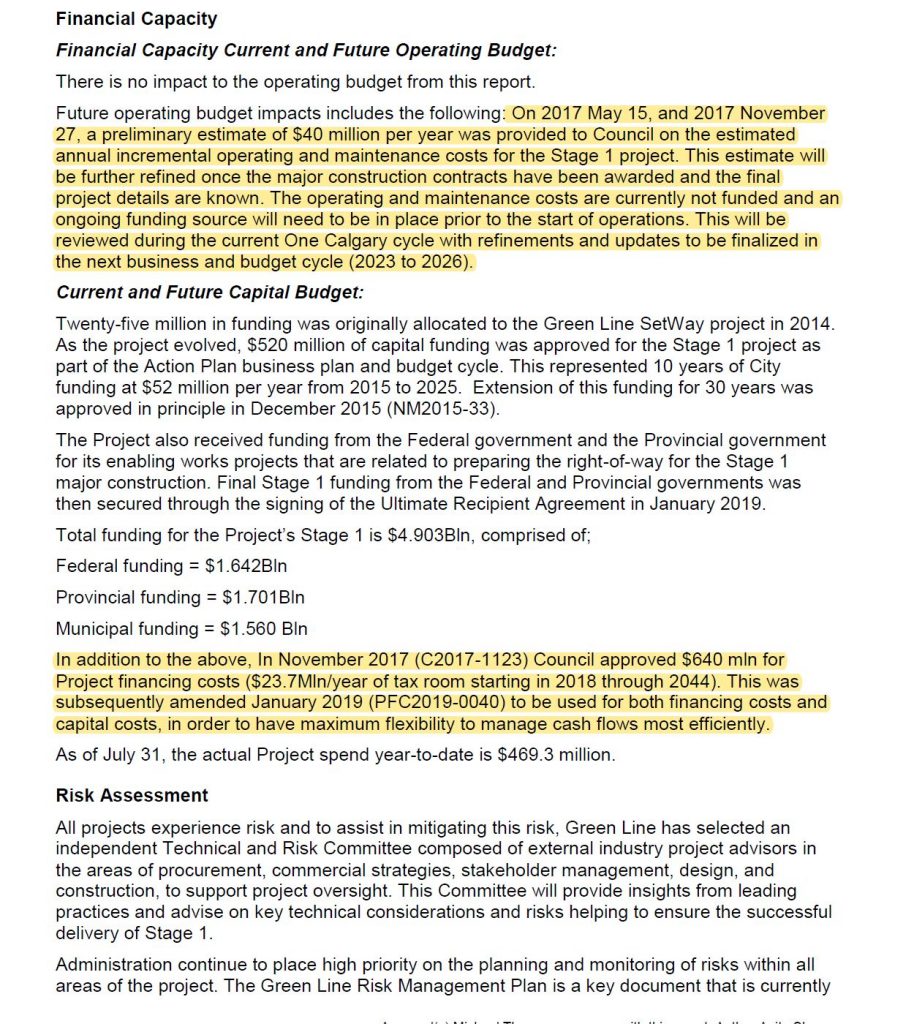
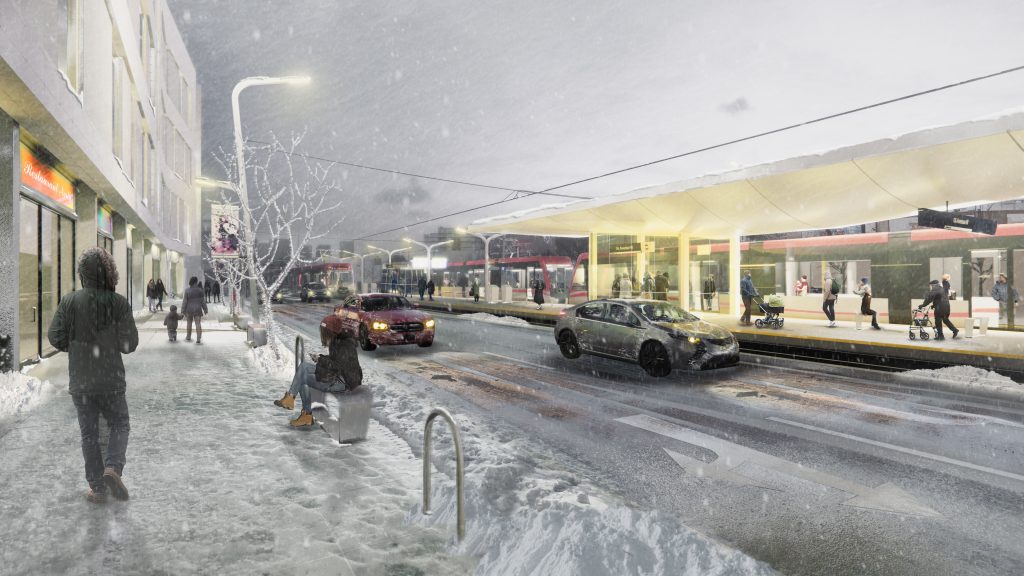
Has the LRT project doubled? NO.
This is one of those questions that is asked and answered a lot, and to make the answer stick I’m writing this blog.
The original 46 Kilometers of LRT was planned 10 or 12 years ago. So sure, inflation is one of the reasons we have seen an increase, but one of the main reasons is actually that when the Green Line was first conceptualized it was planned to be at-grade. That also happens to be the least expensive approach. On average, an at-grade LRT runs about $100 million per 100 km. That comes in at roughly $4.5 billion for the expanse of LRT line from the far north to the deep south.
Engaging the citizens of Calgary is a very essential part of the Green Line process, and according to what we’ve heard from Calgarians, to do this project right mean:
- That the Green Line component running through the downtown core should be underground;
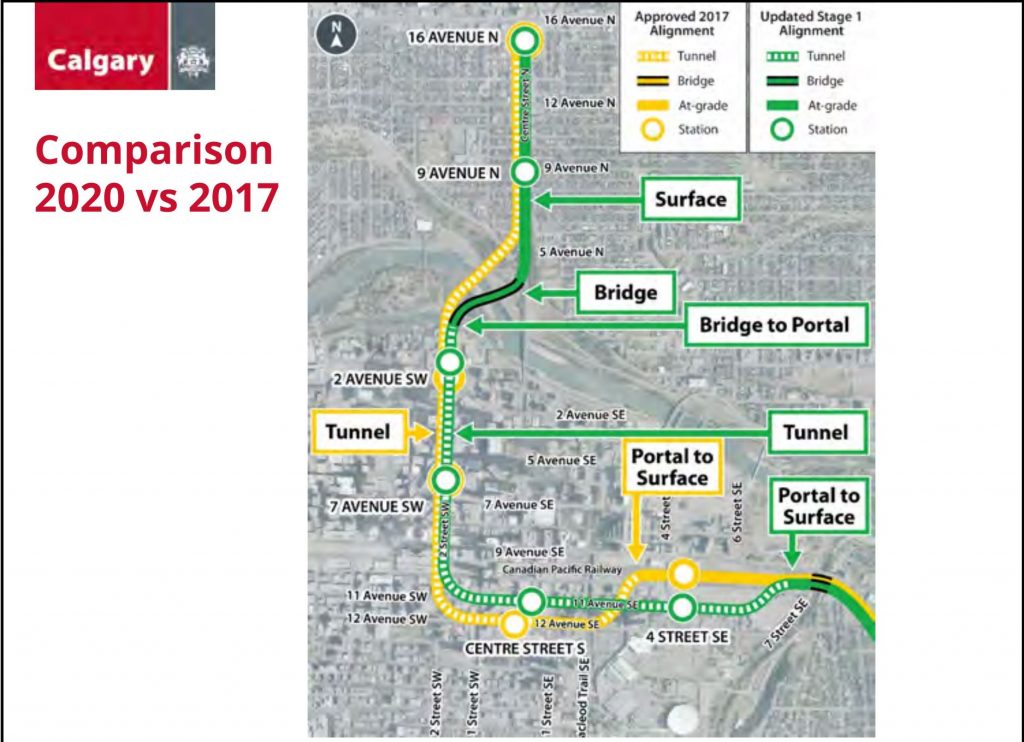
- That some locations needed to be altered to allow for better transit-oriented developments, which will better suit commuter needs while providing some interesting possibilities for the future.
So looking at the original price and the original plan and comparing that to what we have heard from residents, we can see why costs have gone up. Changes like underground tunneling mean an increase in cost.
There are also the technical realities. Some sections of the Green Line are going to be more expensive than others due to challenges with factors such as, land acquisition, construction, and unforeseen obstacles. I know the Green Line Team has done their due diligence in preparing for these things. They eat, sleep and probably even dream about the Green Line.
The first phase, which will run from 16th Avenue in north to 126 Ave in the south is the most expensive part of the project. But it’s also the most critical. We are tunneling through the core, we are building a maintenance facility, and we are buying vehicles for the fleet.
We’re building the most expensive part of the line first, so the Green Line has not doubled in cost as some have said. The remainder of the Green Line will be less expensive than Stage 1 because we will have the key pieces of infrastructure in place. At this point, we will already have the path through downtown, the maintenance facility, and the train cars. The land needed for the Green Line in the far North and deep South have already been acquired.
I like to think of it like remodeling a house. When we look at remodeling a house, what are the two most expensive rooms to renovate? The bathroom and the Kitchen. Which two rooms provide the most utility to us? The bathroom and the kitchen. When you look at renting an apartment or a home, those two rooms often make the decision for you.
The Green Line will be a key piece of infrastructure that provides opportunities and utility for Calgarians and Calgary as a whole. And that’s what we’re building first, the bathroom and the kitchen.
When we look at why the price has changed, it’s because of the long time it’s taken to get here, the changes in construction style, but most importantly it’s because we listened.
]]>
It’s interesting and a bit spooky how history has a tendency to repeat itself. The same arguments, the same sentiments, the same concerns of Calgarians are still prevalent now.
I have a lot of hope for the Green Line when I think back to Calgary’s struggles for an LRT system during the 80’s. The economy wasn’t in great shape; a once booming Albertan economy was heavily shaken by the 1980 Oil Crisis which saw the value of oil fall drastically.
But did that stop us? No, we continued to build a future for Calgarians; we continued to prove Calgary’s strong ingenuity and foresight.
Here are some smart words from a smart guy that was very well liked, and although they might be 40 years old, they still ring true today.
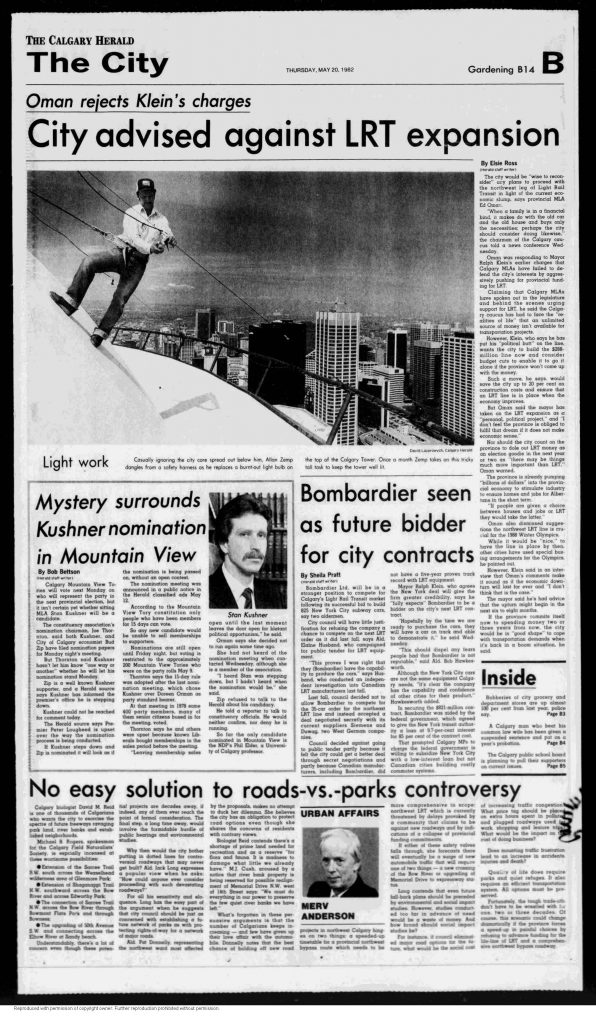
“Oman’s comments make it sound as if the economic down turn will last forever and I don’t think that’s the case. The upturn might begin in the next six to eight months. If the province commits itself now to spending money two or three years from now, the city would be in good shape to cope with transportation demands when it’s back in a boom situation.”
Ralph Klein, Calgary Herald May 20 1982

“Any project that creates jobs is a benefit to the community.”
Ralph Klein, Calgary Herald November 19 1982
Sound Familiar? Ralph Klein had a great vision for Calgary. His vision was one of resiliency and the ability to create jobs. While it may be gradual, after every economic downturn, Calgary has experienced a steady period of growth in the years after.
When we look to the future of Calgary, we also need to look towards the future of transportation. The need of Calgarians for a transit system that links them to citywide opportunities and services will always exist.
Some people may say that folks won’t touch Downtown after COIVD-19, so there won’t be a need for transit. I don’t think a barber can cut you hair over FaceTime, nor could you get a flu shot over the phone.
And while many Calgarians are afforded the ability to work from home, just as many are not.
Building the Green Line will provide transit service for families that cannot afford to purchase another vehicle for their driving-age children to get to school or their part-time job. It will provide transit service for parents who work $15 an hour and cannot afford to pay $10 an hour for parking. It will provide transit service for seniors who live on a fixed income, whose health may not afford them the ability to drive.
Here’s a snapshot of just some of the Calgarians who use transit, and are in desperate need of the Green Line.
When we look to the future of Calgary, transit is key component. All the different reasons and faces of why we need transit will continue through the tough times.
You can always find something wrong with a project, but it doesn’t mean that its not worth doing. The Green Line is part of Calgary’s recovery. Transit ridership will always keep growing – through the good, and the bad.
And if you don’t believe me, then believe Ralph Klein.
]]>I wish to extend a thank you to all the individuals that have been working hard on refining, developing and communicating these Green Line Developments. I would also like to thank all of the Calgarians that spent the time to participate with the online and in-person engagement opportunities.
Public engagement on the updated Stage 1 alignment, with a focus on Segment 2- Elbow River to 16 Avenue North took place from January 29 to April 30th 2020, with the purpose of gathering feedback understand public sentiment
In-person events included:
• Four open house events held in March in communities where changes to the alignment were proposed, including Beltline, Eau Claire, Chinatown and Crescent Heights
• Six pop-up information sessions held in various locations along the entire Green Line route from North Pointe to Seton
• Five drop-in storefronts held in Crescent Heights
Online engagement was hosted on The City of Calgary engage portal www.engage.calgary.ca/greenline and via The City of Calgary’s Citizen View Panel survey.
Feedback was also collected via email and 311. In total, in-person engagement events were attended by nearly 1,300 Calgarians and over 5,000 online comments were received.
Before we proceed with the new updates, I would like to draw you attention to some key dates to be ready for.
Mark your calendars for:
Online Presentations – May 20 & 21, 2020, More details to be posted soon. Check Here
• Wednesday, May 20 – 12 p.m. to 1:30 p.m.
• Thursday, May 21 – 7 p.m. to 8:30 p.m.
Participation in the Green Line Committee Meeting on June 1
The Green Line Committee meeting on June 1 will have a public feedback component. To limit the spread of COVID-19 and to avoid mass gatherings, people can participate in the meeting virtually and by telephone.
How to provide a public submission:
• Written public submissions are due at 12 p.m. on May 25. Use the online form to provide a written public submission. Form can be found here: www.engage.calgary.ca/greenline
• Members of the public can sign up to speak at the meeting until June 1, just so long as the item they want to speak to hasn’t already passed.
• Public wishing to speak are invited to contact the City Clerk’s Office by email at [email protected] to register and to receive further information.
• City Clerks will send out instructions on how to speak during the meeting by phone to members of the public who register leading up to and on the day of meeting.
You can watch the committee meeting online HERE
And now a summary of the Updates
Centre Street North

- Recommending a middle-running alignment on Centre Street N to balance community desire for pedestrian realm improvements, like comfortable and safe for pedestrian sidewalks, opportunities to plant trees, access to businesses/ community and efficient LRT operations with top LRT speed of 50km/ hour
Surface-running LRT in the middle of Centre Street N provides dedicated left turn bays at
- 16 Avenue N in both the southbound and northbound directions
- 12 Avenue N in both the southbound and northbound directions
- 10 Avenue N in the northbound direction
- 9 Avenue N in the southbound direction
- 7 Avenue N in the northbound direction

The City is recommending a station at 9 Avenue North as part of Green Line Stage 1
- Would allow better connection to Crescent Heights
- Enable more opportunities for transit-oriented development in Crescent Heights
- The smaller community sized station that would be constructed at 9 Avenue North will help manage project costs and fit into the context of the Neighborhood
Bow River Crossing
The city is continuing its refinement of how the bridge will connect on the north and south sides of the Bow River, and how it will integrate within the surrounding natural and built environment.
- The City is recommending that the new LRT bridge include a multi-use pathway for pedestrians and cyclists. Details of how this will be incorporated into the structure will be determined during the next stage of bridge planning.
What happens to existing Centre Street Bridge?
- To support improved travel time reliability for BRT users in north Calgary, the two centre vehicle lanes on the Centre Street bridge will be re-purposed as permanent dedicated BRT lanes.
- Outer lanes will remain useable for vehicle traffic
Downtown
Integration of the 2 Avenue S.W. Station and Portal into the Eau Claire Market redevelopment site
- The Green Line Team have responded to concerns expressed by area businesses and property owners by revising the 2 Avenue S.W. station area by moving the portal and station out of the road right-of-way and integrating the LRT infrastructure directly into the future Eau Claire Market redevelopment site.
By integrating the portal and 2 Avenue S.W. station into the redevelopment site, the LRT alignment will remain partially underground until the train exits through a portal at the north end of the property, in the vicinity of Waterfront Mews S.W. This new station layout could mean that Green Line will not impact the existing public road network in the area.
Opportunities for integrated stations: Downtown and Beltline
- The City is continuing to work on the planning of underground stations at 7 Avenue S.W., Centre Street S, and 4 Street S.E. to determine exactly where station and their entrances will be located
- Over next few months the Green Line Team will be meeting with developers and landowners in station areas to explore potential opportunities to collaborate on integrating station entrances into existing or future private developments.
Potential North Central BRT Improvements


For more information you can visit www.engage.calgary.ca/greenline
]]>This pandering does not represent the needs of Calgarians, only the impatience of those who cannot wait for answers already on the way. So I ask, why bother?
Here’s the break down.
- We are already presenting and discussing these things on the June 1
- The Key dates and public participation have been widely shared and promoted.
A press release about putting forward a surface level Notice of Motion might generate some headline clicks, fails to acknowledge that Council is already set to have a great debate regarding the possible alterations, and impacts of a global recession and pandemic on the June 1, 2020 Green Line Committee.
If we were to rush this to a sooner date, it had better be for good reasons. We would only be depriving citizens with the opportunity to engage. Wouldn’t it be disrespectful to tell the public that submissions are due on May 25, and then pull the rug from under them, especially after 2 or 3 months of fair notice? This is not empowering our citizens to engage in city-building.
The Green Line team is scheduled to provide additional information on the updated stage 1 alignment starting May 12. Which will include
- The recommended Stage 1 route
- Updates on items the team was still exploring
- Answers to frequently asked questions
- What we heard during public engagement
Also, the Green Line Team is hosting a virtual presentation on the update stage 1 alignment on May 20th and May 21st.
The financial catastrophe as Councillor Farkas puts it would only be if we were to entertain pointless delays. Our construction industries continue to be vibrant and successful during the pandemic.
Investments in transit service like the Green Line is made because of affordability.
- Building the Green Line will provide transit service for families that cannot afford to purchase another vehicle for their driving-age children to get to school or their part-time job.
- Building the Green Line will provide transit service for parents who work $15 an hour and cannot afford to pay $10 an hour for parking.
- Building the Green Line will provide transit service for seniors who live on a fixed income, whose health may not afford them the ability to drive.
There are always lower cost options that can be constructed, but they will not provide the long term City building opportunities.
- Data shows that transit ridership grows over time, through economic ups and downs.
- Investments in transit infrastructure is for the long-term. Green Line is planned for long-term city building opportunities.
- Green Line will spur redevelopment and investment opportunities in Calgary’s communities. This will in turn create local jobs for Calgarians and keep more people employed through the economic recovery.
- Stage 1 of Green Line would be finished in 2026, plenty of time in a post COIVD-19 world. Green Line will be ready to serve the needs of Calgarians when Calgarians are ready for recovery.
Now is the perfect time to invest in infrastructure and prepare for the future.
- The recommended plan is focused on the long-term development of the City, and addresses many of the stakeholder concerns that we have heard.
- We’ve heard from stakeholders that Green Line is important for connecting people to jobs, places, and for improving mobility.
- High quality transit is a necessity for cities to grow, for cities to be attractive to a talented workforce, and for cities to be a competitive economic centre with others. This is necessary for the long-term recovery of Calgary.
- As long as there’s a need for new developments and new communities for new Calgarians, there will be a growing need for transit.
Continuing drastic inquiries and ad hoc questioning when many have been already answered, or are being answered is a disservice to the Calgarians with a dire need for efficient and reliable transportation.
Recessions do not last. Pandemics do not last. Calgary’s vision of being an excellent city that provides an effective transit system to its citizens, and with it the ability to be connected to jobs and opportunities will.
]]>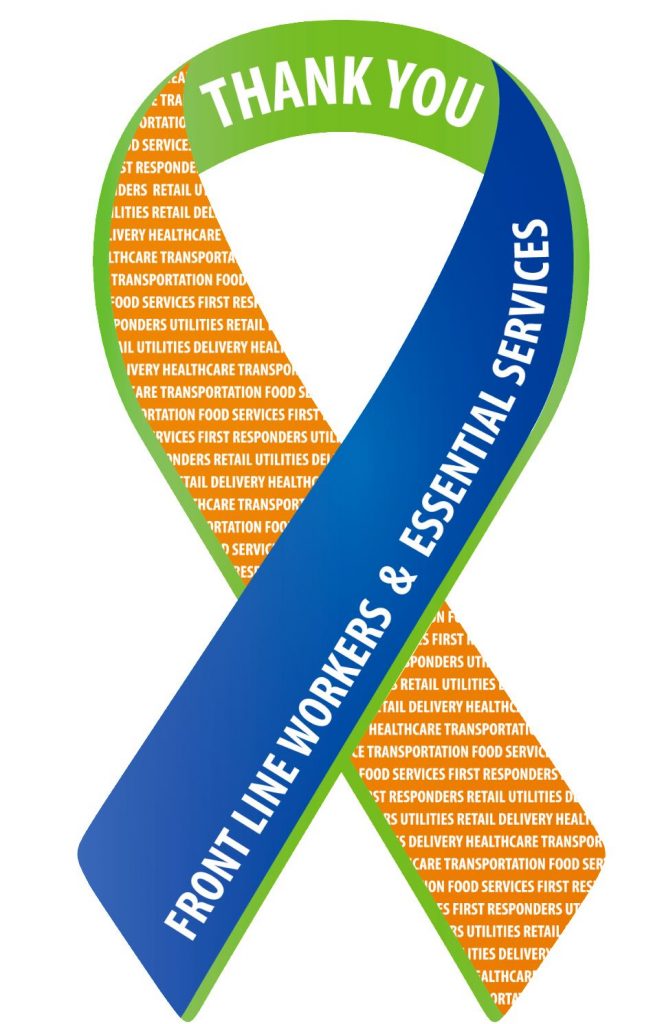
PRESS RELEASE – The City Shows its Gratitude to Front Line Workers and Essential Service Staff with Commemorative Ribbon Campaign
For Immediate Release
Calgary, Alberta – Monday, April 27, 2020 – Councillor Shane Keating with the unanimous support of City Council will be bringing forward an Urgent Notice of Motion to the Combined Meeting of Council on Monday, April 27, 2020 and proposing the acceptance and placement of 5000 Front Line Workers and Essential Service Staff awareness ribbon decals on all City of Calgary owned vehicles.
The intent of this campaign is to publicly recognize and show The City’s thanks to the Front Line Workers and Essential Staff Services with a with a symbol of commemoration, a ribbon decal for their selflessness and efforts to support Calgarians during the COVID-19 pandemic.
“All though we can say thank you on the Council Floor, we need a public, noticeable way to express our deepest gratitude to the individuals working on the front line and providing Calgarians with the essential services necessary to the well-being of Calgary. Many of these people are our colleagues at The City; they supply us with clean water, fix our roads, provide our utilities, ensure our homes are working properly, and keep stores shelves stocked.”
- Councillor Shane Keating, Ward 12
Can West Legacy Corporation, ULS landscaping, and other corporations are providing the decals to The City at no cost, with coordination by Sean Burnand and Shawna Sorensen.
“My staff have donated their time and this small gesture to simply say Thank-you to all the front line and essential service workers we thought was the very least we can do. We have also been approached by other companies wanting to assist, and I want to make it very clear we do not wish to profit from this is any way! This is just a Thank-you!”
- Sean Burnand, Can West Legacy Corporation
Any organizations or individuals wishing to support this ribbon initiative, whether through donations, or are looking to acquire their own ribbons to display can contact Can West Legacy Corporation by visiting http://canwestlegacy.com or emailing [email protected] or calling 403-252-1800
NM 2020/04/27
RE: HONOURING CALGARY’S FRONT LINE WORKERS AND ESSENTIAL SERVICE STAFF
COUNCILLOR KEATING; DEMONG; DAVISON; SUTHERLAND; MAGLIOCCA; GONDEK; CHU; CHAHAL; FARRELL; WOOLLEY; CARRA; JONES; FARKAS; COLLEY-URQUHART
MAYOR NENSHI
WHEREAS the COVID-19 pandemic is forming a long-lasting impact on the lives of Calgarians, be it financially, mentally, physically, emotionally and even spiritually; now is the time to express our thanks to the Essential Service Workers on the front lines that are paramount to the well-being of Calgary;
AND WHEREAS, a ribbon is a traditional symbol of appreciation, respect and commemoration commonly displayed by citizens who support the efforts of our Essential Service Workers, Doctors, Nurses, Care Facility Providers, First Responders, Food Services, Transportation Services, Retail Services and Utilities Services, and many more too numerous to name;
AND WHEREAS this gesture is a simple thank you to all the Essential Service Workers, and is one of the few things The City can do to show our support for these individuals;
AND WHEREAS, Can West Legacy has secured financial backing (in part from Can West Legacy Corporation, ULS Landscaping, and other corporations), and are able to produce 5000 ribbon decals at no cost to The City of Calgary;
NOW THEREFORE BE IT RESOLVED, that Council direct Administration to accept a donation of ribbons from Can West Legacy and place a new front line and essential services ribbon decal on all City of Calgary owned vehicles to show gratitude and support for all the efforts by Essential Service Workers during the COVID-19 pandemic.
AND FURTHER BE IT RESOLVED, that these new ribbons to be displayed on City of Calgary vehicles from now through to July 31, 2021.
]]>
I am happy to hear that The Alberta Government plans to double the Capital Maintenance and Renewal Funding from $937 Million to $1.9 Billion. This much-needed boost is going make a big difference when plotting a course for the success and longevity of Calgary’s economy.
This will help with some of the biggest economic challenges we are facing on the horizon:
- Creating jobs for Calgarians;
- Keeping companies operating; and
- Bringing money into our economy.
Simply put, this announcement from the Alberta Government is a great kick-start.
We can expect that significant additional work will be undertaken, including $410 Million for transportation projects. Compared to the 2019 Budget, this year’s (2020- 2021) will see an increase of 21 per cent.
This is great, now what if we could do something similar to the Green Line funding?
Green Line is the easiest decision we can make right now
A significant Provincial contribution can allow us to not only continue moving forward with Green Line, which will generate an estimated 20,000 jobs and contribute to 65,000 riders on opening day, but allows us to progress the scope of Phase 1 to include Prestwick and McKenzie Towne Stations.
And extending the scope of the project to include one of the cheapest and most impactful components of the Green Line (only costing around $200-$300 million) just makes sense.
Why is McKenzie Towne so important? A station here would be perfectly situated in the heart of four communities: McKenzie Towne, Prestwick, Copperfield, and New Brighton. This will provide better Transit opportunities to over 45,000 Calgarians. Having a station in the middle of the population will also make Transit more accessible for the communities of Mahogany and Auburn Bay (29,000 residents).
That’s 74,000 Calgarians that will have an easier time getting around the City; giving them more options of where they can work, live and play.
For 10 years in a row, Calgary has ranked in the top five of The Economist Intelligence Unit’s Global Livability Index. Calgary plays a large role in Alberta’s economy. And as we know, the well-being of Alberta’s economy is vital to the Canadian Standard of living.
The number one priority of City Council is to keep Calgarians safe and to best support our citizens. While protecting individual’s health, we must also protect The City’s sustainability and ability to go back to work. This includes long-term investments that will kick-start the economy. The economic costs of a global pandemic is difficult to quantify, and our success depends on how we enable our businesses to continue operating once the dust settles. The Green Line is a vital piece of Calgary’s transit network and is needed to unlock the true development potential of communities in South Calgary.
]]>What Council Approved and What this Means for Individuals and Businesses
Council approved an effective 0% tax increase on the City portion for 2020. After adding in a number of other factors that is an 11.27% decrease for non-residential accounts and a 7.51% increase for residential accounts. That’s only an additional $150 in 2020 for a typical residential property with a $455,000 assessment. Here’s how we got to those numbers:
- Council approved an effective 0% increase for 2020 by approving a 1.5% increase and a 1.5% rebate;
- Council approved $13M to make-up for Provincial budget shortfall to the police budget;
- We shifted the ratio of property tax to 52% residential and 48% non-residential to help address the economic challenges that businesses in our City have been facing due to falling property values. We have about 500,000 residential accounts in the City compared to about 14,000 non-residential accounts. We needed to make this shift to help businesses and move to a more equitable tax distribution. It has far less impact to individual households to spread out more of the tax burden over about 500,000 residential accounts compared to the impact it would have on each of the only 14,000 non-residential accounts;
- Council approved a $30M municipal non-residential phased tax program to further assist businesses that have seen the highest tax increases.
I understand we are facing a big challenge right now, so Council has approved additional relief measures to support taxpayers facing financial hardship. Property tax bills will be mailed by the end of May as usual however, two new significant relief measures were approved to provide flexibility for taxpayers:
- The tax payment deadline has been extended from June 30 to September 30 without late payment penalties; and
- The Tax Installment Payment Plan (TIPP) has suspended its two per cent (2%) filing fee for taxpayers who join TIPP after January 1, which has been suspended until January 1, 2021. This enables taxpayers who use The City’s monthly TIPP to cancel their monthly payments now and rejoin the program by September 30, 2020 to meet the tax payment deadline without administrative fees. There is no action required from property owners to access the deferral.
Is this a perfect solution? No. And we are continuing to explore other relief measures that we could provide. But we need to start somewhere and work with the facts: we need to continue to provide City services that are funded through property taxes, the City cannot run a deficit, we need to coordinate our efforts with other levels of government to get folks the most relief while maintaining the services we rely on, and cancelling capital priority projects is not the answer. I’ll explain what I mean:
The City Cannot Run a Deficit
According to Provincial legislation the City can’t run a deficit. Our income and expenses have to balance every year. The City also has very limited tools to generate revenue and property tax is the main tool. The other reality is that the overall effects of the global COVID-19 pandemic have put stresses on all areas of the City. Our first priority is to maintain the wellbeing of Calgarians and to do that we need to focus our efforts on sustaining City services that we all rely on; services like the fire department, the police, roads, and transit. While we are adapting the ways we deliver services, we must be aware of the revenue impacts the City is suffering. Presently Calgary Transit has seen a 90% reduction in C- Train ridership, along with a 70% reduction in key bus route and MAX ridership. No access to recreation centres or arts and cultural activities either. Lost revenue from closures and payment delays of utilities are some of the ways the City is losing revenue. We are losing an estimated total $15M a week. In the future, we can expect market volatility and economic conditions that challenge our ability to generate revenue. By laying the groundwork now, we can lessen the impact of the uncertainty that is to come. We cannot run a deficit to cover these losses or to provide the services that we rely on so we cannot simply cancel this year’s tax bills.
We Need a Coordinated Effort
We also need to coordinate with the relief programs that other orders of government are providing. Both the Federal and Provincial governments are providing a range of supports to individuals and businesses and we need to look at how the City can support an overall response while still providing the service that we rely on. The City is continuing to advocate to other orders of government for additional aid to vulnerable citizens, aid to businesses, aid to municipalities, stimulative infrastructure, and long term economic resilience and a new deal for cities.
Cancelling Priority Capital Projects is Not the Answer
Now I am hearing some suggestions that we pull out of some big projects; namely the Green Line, the Event Centre, Arts Commons, the BMO Centre, and the Fieldhouse. I believe this would be a detriment to the long-term sustainability that is vital for Calgary’s prosperity. Firstly, cancelling these projects won’t realize a significant tax savings today. For most of these projects the dollars are being spent in future years. And, these projects are being paid for from funds other than property taxes. For example, the CRL or the MSI funds. Secondly, these projects will have a benefit for Calgary’s economy. The Arts Common, BMO Centre and Events Centre combined will add over an estimated $1B to Calgary’s economy. Moving forward with the BMO Centre and Arts Commons alone would create 6000 Jobs for Calgarians, which will be crucial during the recovery from the COVID-19 pandemic.
To desert our commitment to these projects would be leaving a significant amount of funding from other orders of Government on the table. We would be abandoning a potential of about $3.7B that likely would not be injected into Calgary otherwise.

This is a hugely difficult time for everyone and as a City we are continuing to work on ways to bring more relief. And we need to do that in light of the facts.
For more information on how to access the relief being provided by the City you can visit: https://www.calgary.ca/CSPS/cema/Pages/Response-to-Coronavirus.aspx.
]]>ENMAX COVID-19 Relief Link
Important Phone Numbers
- Emergency – 911
- Health Link – 811
- Addiction Helpline – 1-866-332-2322
- Family Violence – Find Supports – 310-1818
- Income Supports – 1-866-644-5135
- Kids Help Phone – 1-800-668-6868
- Mental Health Helpline – 1-877-303-2642
- MyHealth.Alberta.ca: List of Important Numbers
- Toll Free Crisis Line / Distress Centres
- 780 area code: 1-800-482-4357
- 403 area code: 1-800-784-2433
COVID-19 Resources
- COVID-19 online screening (AHS)
- Coping and Connection for Children & Families During COVID-19 (AHS)
- COVID-19 and Your Mental Health (AHS)
- Practical and Emotional Preparedness for a Pandemic (AHS)
- Mental health and coping with COVID-19 (CDC)
- Talking with children about COVID-19 (CDC)
- Talking with children during infectious disease outbreaks (SAMHSA)
- Find a Doctor
- Healthcare Locator
- Indigenous Health
- Know Your Options
- Alberta Ready – Are You Prepared?
Mental Health & Stress Management
- Addiction: Helping Others
- Cognitive Behavioural Therapy self-help strategies
- Depression: For Family and Friends
- Managing Anxiety Disorders
- Managing Depression
- Managing Mental Disorders
- Mental Health Meter
- Promoting Positive Mental Health
- Supporting a Family Member
- Stress Management
- Ways to Relieve Stress
- Ways to Avoid Stress
- Setting a Goal to Reduce Stress
- If You Need More Help
- Stress in Children and Teenagers
- Stress Management: Helping Your Child With Stress
- Tips for Managing Stress
Social & Employment Help
- Affordable Housing
- Alberta Income Support
- Canadian Red Cross
- Center for Suicide Prevention
- Community Services 211
- Crisis Services Canada: Local Resources & Support
- Emergency Women’s Shelters
- Family and Community Support Services
- Family Violence – Find Supports
- Find Shelters
- Foodbanks Alberta
- Income Support – For Basics
- Sexual Assault Response Team
- Facing a Layoff
- Job Fairs
- Job Loss Work Book
- Job Search
- Resume Writing
Committee had an opportunity to have an in-depth workshop with Administration, and by the end of the day Administration presented a solidified, updated Stage 1 route option to the Green line Committee. These changes will help address construction risks, cost and customer experience concerns of the project.

One of the most surprising and positive aspects of the route update is the 21 Kilometer BRT enhancement from 16 Ave to Northpointe. This will spark noticeable changes, as enhancements will directly increase customer service quality and comfort for riders, while addressing challenges of congestion and delays by creating better transit priority. If you have any questions or concerns, feel free to contact your City Councilor, even if it is just to congratulate them.
Updates to the Stage 1 alignment include:
- 21 Kilometers of North BRT enhancements
- A surface alignment on Centre Street N and a surface station at 16 avenue N
- A bridge over the Bow River
- A surface station at 2 Ave S.W. in Eau Claire
- 7 Ave underground station
- An underground alignment on 11 Ave in the Beltline, and an underground station at 4 Street S.E.
You can take a look at the full presentation, including what Administration has studied, what has changed, and what to expect at : Here
These changes will allow us to maximize ridership, directly connect people to the core, the Beltline and the Entertainment District. We will be able to facilitate future expansion to the north and south of The City, while the BRT enhancements will improve transit for residents in the north. The Green Line is Calgary’s largest infrastructure investment to date, and is designed to be both a transit system and a platform for development, one that will shape our city. Providing efficient service and connection to destination throughout the city, and areas where people can live affordably with access to amenities, services and sustainable mobility options.
I want to assure you that we are still committed to the full scope of the Green Line LRT project, and will eventually extend the project from Seton to 160 Ave. Work is continuing to advance the functional planning, land acquisition program, and funding opportunities for stage 2.

So our next step is to engage with the community. We welcome you to provide us with your feedback, and you can do that by visiting https://engage.calgary.ca/greenline. The online engagement period will be from January 29, 2020 to March 9, 2020. You can help us ensure we are building the highest value transit system for Calgarians. You can also watch for in-person engagement opportunities from March 1 – March 9, 2020
I feel proud to say that we have done our utmost to bring credibility and confidence back to this project. Over the next two months, we will see more of the studies and incredible work that has gone into a project as exceptional as this, especially being rebuilt and put back to where we can make a decision in March. I think it will be the right decision. While some will say that it is unfortunate that the line will not, at the moment reach to Seton; I will continue to fight for Ward 12, but not to the detriment of the rest of the city. We need to look at this project in its entirety, and for what it accomplishes for the future of Calgary. As we move forward, we will remain focused on making this the best possible transit system it can be.
]]>